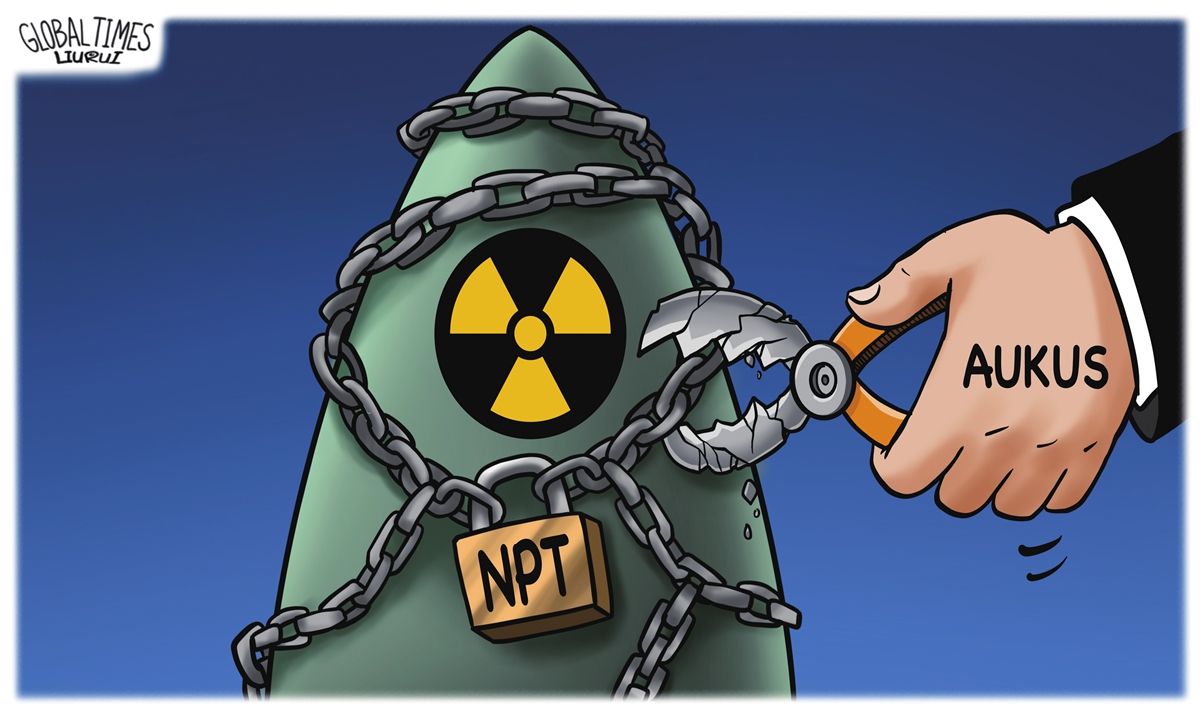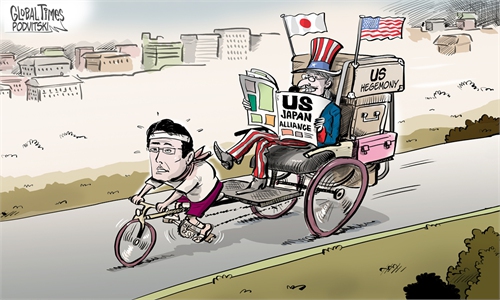
Unchaining peril Illustration: Liu Rui/GT
As leaders of major countries in the region and the world met in the Asia-Pacific, AUKUS, the trilateral security pact between the US, UK, and Australia, has suddenly become a hot topic for discussion again.
French President Emmanuel Macron on Thursday criticized Canberra's decision to turn to Washington and London for help building nuclear submarines. He accused the decision made by former Australian Prime Minister (PM) Scott Morrison of "re-entering into nuclear confrontation, making himself completely dependent by deciding to equip themselves [with a] submarine fleet that the Australians are incapable of producing and maintaining in-house."
Meanwhile, the French leader promoted his country's conventional submarines to Canberra. He knows that this may still work to advance his country's interests, since the purchase of conventional submarines does not contradict Australia's goals of developing nuclear-powered submarines in partnership with the US and UK. Moreover, AUKUS is facing problems over technology transfer and the violation of conventions over nuclear proliferation, so Macron was trying to remind Australia that it has a better option.
But it seems Australia is not going to abandon the AUKUS anytime soon. In response to Macron's remarks, the Australian PM Anthony Albanese claimed his country will continue pursuing its current approach to obtain nuclear-powered submarines under the AUKUS agreement.
No matter what Macron's intentions are, his words have alerted Canberra again about the potential risks of engaging in a dangerous partnership such as AUKUS. The pact undermines Australia's sovereignty and serves to provoke China, one of its most important partners. It is a threat to the country's interests.
According to media reports, Albanese said AUKUS was not brought up on Tuesday during his first bilateral meeting with Chinese President Xi Jinping. It may have gone unmentioned due to a tight schedule or simply to facilitate a friendlier atmosphere for the talks between the two leaders. Yet, the Australian PM cannot and should not take it as signs that China is not concerned about the pact or even signs of a concession over the arrangement.
China has consistently voiced its strong opposition to AUKUS. Most recently, Wang Qun, China's Permanent Representative to the United Nations in Vienna, emphasized on Friday again at a meeting of the Board of Governors of the International Atomic Energy Agency (IAEA) that China is opposed to using the organization's budget for safeguard activities related to nuclear submarine cooperation under AUKUS.
China's attitude is clear: It is not against establishing security pacts or military cooperation between countries in the Asia-Pacific region, as long as they don't target a third country in an attempt to undermine its interests. This also applies to the relationship between Australia and the US. What Beijing hopes for Canberra is that the latter will not follow the US blindly in challenging China's interests, becoming a pawn in the US' Indo-Pacific Strategy to contain China.
AUKUS is clearly a threat to regional peace and security, as well as a barrier to improving China-Australia ties. After the recent bilateral meeting between the Chinese and Australian leaders on the sidelines of the G20 summit, it is widely hoped that this will inject more positivity into what have been deteriorating bilateral relations. However, if Canberra chooses to ignore Beijing's concerns over AUKUS, the pact will remain a thorn in the side of China-Australia relations. It is also likely to undermine a clear pathway to the healthy development of bilateral ties.
As part of Washington's scheming, AUKUS is a tool to stir up trouble and create unwarranted suspicion about Beijing's intentions in the Asia-Pacific region. If Australia doesn't want to send the wrong signal to China and deepen the distrust between the two countries, it needs more strategic sobriety when it comes to AUKUS.



